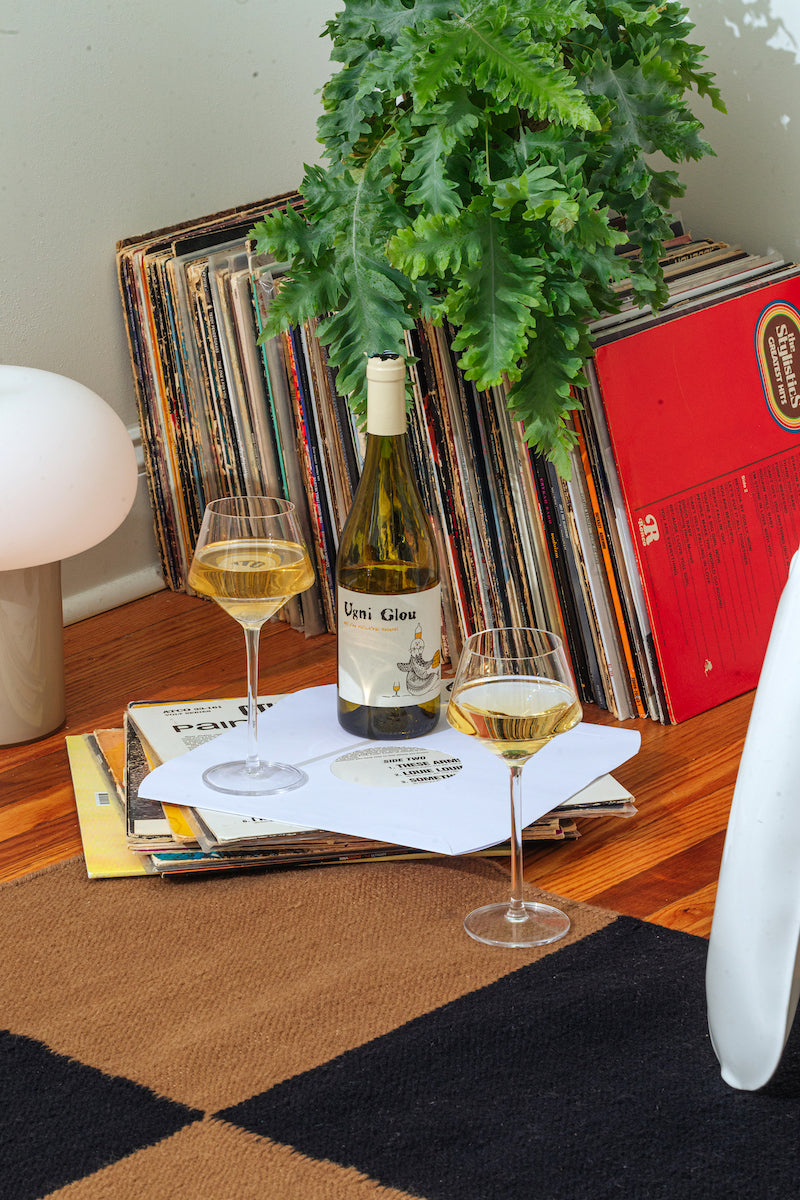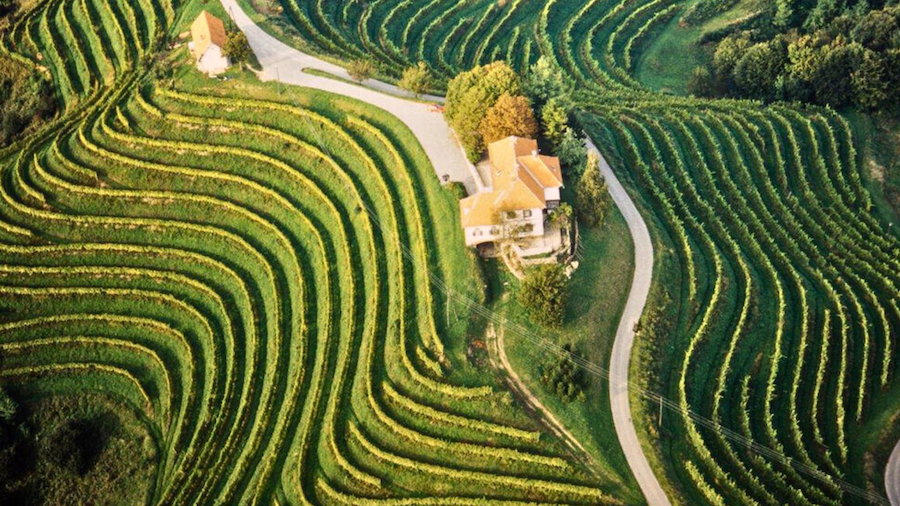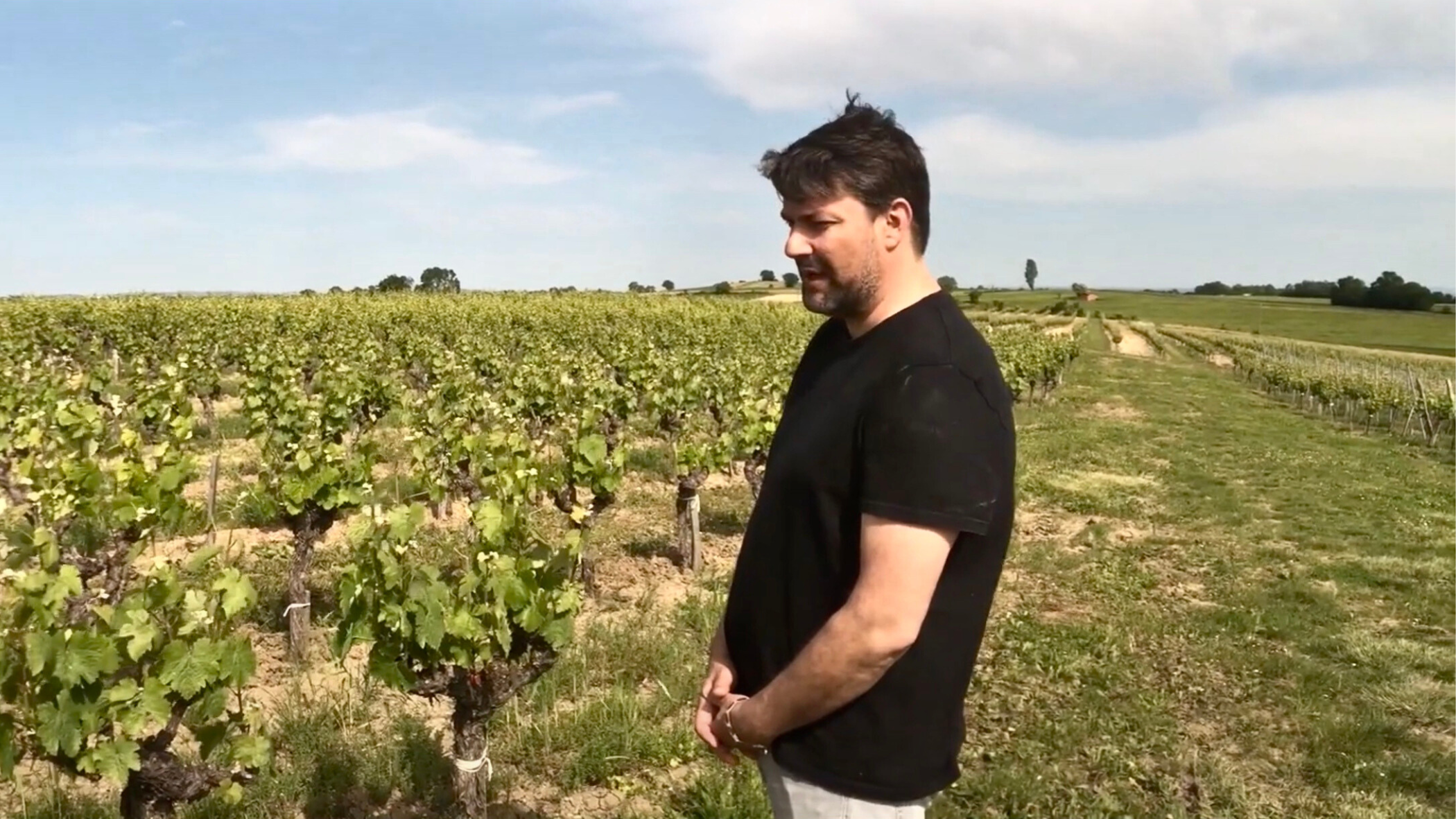October 2023 | 12 Bottle Club

Welcome to the October 12 Bottle Club from MYSA Natural Wine!
A note from our founder:
Welcome to October! Whether it's still hot (pull out the Confondo, or rose) or you're headed to a Halloween party (Lammidia is always a crowd pleaser), or you want to have a food friendly evening, we have you covered for all the things you want to do this month! We also have our FIRST (and definitely not last) Kosher wine that you should store for Passover if you observe it!
-Holly, Founder - MYSA Natural Wine
- Haložan Red 1L - Pullus Ptjuska Klet
- Le Rouge Kosher - La Ferme Rouge
- Siller Balatonboglar Red - Kristinus Borbirtok
- Zweigelt - D'Ora
- La Pinot Noir - Coujan
- Arcipressi Rosso - Fabbrica di San Martino
- Oranzna - Dorcha
- Bianco Anfora - Lammidia
- No Es Pituko Orange - Viña Echeverria
- Michi's Farm White - Gindl
- Rajnai Rizling - Levente
- Adele - Distillerie Cazottes
- Wine Evaluation Sheet
Haložan Red 1L - Pullus Ptjuska Klet
Štajerska - Slovenia
Description:

A juicy Haložan red blend with wild berry fruit flavors, bright acidity, and smooth tannins.
Pairings: Saucy Hungarian Goulash, Sausage & Peppers Skillet, Chicken Tomato Pasta
Serving Temperature: 55°- 60°F
About Pullus Ptjuska Kle

Ptujska Klet winery cellars have been used for storing and aging wine since 1239. Located under the historic town of Ptuj founded by the Romans, the Ptuj Cellar is one of the oldest in Europe. Above it one can find a state-of-the-art modern winery focused on vinifying fresh, cool climate wines that Štajerska region is famous for. Varieties such as Pinot Grigio, Sauvignon Blanc and Pinot Noir thrive here and produce vibrant, elegant and fruit forward wines. A casual, light blend known as Haložan is a fun local wine often used for wine spritzers, traditionally made by mixing it with sparkling water. - Vinum
Le Rouge Kosher - La Ferme Rouge
Zaër - Morocco
Description:

Moroccan red blend with powerful berry fruit flavors, purple floral notes, and intense minerality.
Pairings: Moroccan Spiced Brisket, Lamb Shank Tagine, Salmon Burger
Serving Temperature: 55°- 62°F
About La Ferme Rouge

La Ferme Rouge's winemaking history dates to the French occupation in 1933, but it is within the last 30 years that they have started to focus on elevating their farming practices and wine quality. The grape varieties thrive in the climate and soil, the vineyards are farmed organically, and crops are utilized in the winter to improve soil health. The resulting wines are unpretentious and quaffable. - Nomadic
Siller Balatonboglar Red - Kristinus Borbirtok
Balatonboglar - Hungary
Video Coming Soon!

A Hungarian natural red wine with intense berry fruit flavors, bracing acidity, refreshing tartness, light floral notes and tannins.
Pairings: Hungarian Fish Soup, Goat Cheese-Stuffed Chicken, Grilled Mussels & Clams
Serving Instructions: 55°- 60°F
About Kristinus Borbirtok

Winemaker Florian Zaruba works with his partner Janka to run the winery, farm, fine dining restaurant, hotel, and cinema that are all a part of the Kristinus property on the southwest shores of Lake Balaton, Hungary. The winemaking region is quite young on this part of the lake, the largest lake in central Europe. The estate was established in 2005 and currently stands at 55ha in size, opening up the opportunity to offer the wines at a great value. The farming has been biodynamic since 2018, when Kristinus took over as winemaker. - Zev Rovine
Zweigelt - D'Ora
Niederösterreich - Austria
BUY MORE BOTTLES!

Description:

An Austrian natural red wine with wild berry fruit flavors, hints of spice, bright acidity, and soft tannins. Goes well with lighter red meats!
Pairings: Seafood Cioppino, Chicken Adobo, Buffalo Wings
Serving Temperature: 55°- 60°F
About D'Ora

Gerald, a fifth generation winemaker with an educational background in wine management and Andrea Diem took over the Weingut Diem in 2000. Gerald is in charge of the cultivation and vinification of the wines while Andrea is responsible for the wine distribution and marketing.
La Pinot Noir - Coujan
Occitanie - France

Description:

Light and fruity natural red wine from Languedoc-Roussillon region! Loads of dark berries, easy-drinking pinot noir and best to pair with red me
Pairings: Sticky Asian Pork Ribs, Salami Pizza, Stuffed Mushrooms
Serving Temperature: 55°- 60°F
About Coujan

Florence, a fifth generation winemaker, took over Chateau Coujan from her father in 2008. She converted the winery to organics and turned it to an oasis of biodiversity and she manages the winery including her boyfriend, the chef de cave and her daughter and the rest of the team.
Arcipressi Rosso - Fabbrica di San Martino
Tuscany - Italy

Description:

Natural Italian red wine with berry fruit flavors, earthy aroma, notes of herbs and a medium finish!
Pairings: Mushroom Pizza, Bacon Wrapped Smokies, Roasted Pork Belly
Serving Temperature: 55°- 60°F
About Fabbrica di San Martino

Giuseppe Ferrua, an Italian born in Colombia, has been running the Fabbrica di San Martino for over 2 decades now. He sold his retaurant to focus on his farm. This 20-hectare, rich in biodiversity property is located in the outskirts of Lucca, Tuscany, Italy. Today, 5 wines are produced from the 3-hectare vines in the farm, including "Arcipressi", "Rosaspina", and "Rubino".
Oranzna - Dorcha
Štajerska - Slovenia

Description:

A refreshing natural white blend from Slovenia with bursting tropical fruit flavors, floral and citrus notes, hints of spice and clear minerality!
Pairings: Rainbow Quiche, Sausages with Bacon & Apple Sauerkraut, Shaved Fennel Salad
Serving Instructions: 38°- 45°F
About Dorcha

“Located in Ritoznoj in Štajerska, Dorcha is the brainchild of Izidor (Dorcha) Vehovar. He is the 3rd generation of his family to continue the path of viticulture and winemaking, and is intent on a new direction, a friendlier path. A farmer without a conventional view of wine production, a winemaker who is following the local tradition of producing pure, vibrant wines. Gaining from some fresh perspective from his relatively-new neighbor in the village (Nick Gee, Heaps Good Wine Co.), he is now adding to his family's tradition by making exciting wines and made naturally with a modern twist. Izidor is a passionate but humble winemaker in the village of Ritoznoj. He keeps to himself and is often found wandering the wooded mountains of Pohorje, embracing nature and foraging for local mushrooms (a local specialty in NE Slovenia), or in his cellar processing and aging his own salumi and cured meats. - Vinum
Bianco Anfora - Lammidia
Abruzzo - Italy
Description:

Aged in amphora for 10 months. The perfect porch pounder for a sunny day with a really great rounded mouth feel. Notes of vanilla, butterscotch, lime, and green apple.
Pairings: White Meats, Grilled Vegetables, Stinky Cheese
Serving Temperature: 38°- 45°F
About Lammidia

Davide Gentile and Marco Giuliani were childhood friends in Abruzzo, then lost touch. When they found each other again after university, it was with a shared passion for wine, so they decided to try their hands at making it together. Since the beginning of their project, they’ve approached it with a love of both natural winemaking and avid experimentation. They’ve never trained at a formal wine academy, and they don’t rely on agronomists or oenologists. They have learned by trial and error in the vineyards and cellars. In fact, their first fermentation in 2010 was such a disaster that they called in an expert grandma, virtuosa at getting rid of the evil eye, to perform a ritual over their grapes. Apparently it worked, and Lammidia (“evil eye” in Abruzzese dialect) was born. - From Cream Wine
No Es Pituko Orange - Viña Echeverria
Curico Valley - Chile

Description:

Natural orange wine from Chile made of 100% Sauvignon Blanc with savory stone fruit flavors, citrus aroma, smoky herb notes and a grippy finish. Pairs well with fish and light seafood dishes!
Pairings: Garlic Butter Tilapia, Greek Seafood Rice, Bruschetta
Serving Instructions: 44°- 55°F
About Viña Echeverria
 “Originally established to produce bulk wines, in 1990, the winery was converted to produce quality wines for export. In the following years, Echeverria was one of the few boutique wineries to emerge from Chile, and the first family winery from Chile to sell wine to Harrods in London. Eventually, the family started purchasing grapes, to compliment and build complexity to their wines. "We realized that to succeed and be different, we needed to be open," says Roberto Echeverria, the Technical Director Chief Winemaker, who's first solo vintage appeared on the market in 2001. With sustainable practices in the vineyard, Echevarria produces a wine for most every palate, while embracing a philosophy that's based on consistency. - T Edward
“Originally established to produce bulk wines, in 1990, the winery was converted to produce quality wines for export. In the following years, Echeverria was one of the few boutique wineries to emerge from Chile, and the first family winery from Chile to sell wine to Harrods in London. Eventually, the family started purchasing grapes, to compliment and build complexity to their wines. "We realized that to succeed and be different, we needed to be open," says Roberto Echeverria, the Technical Director Chief Winemaker, who's first solo vintage appeared on the market in 2001. With sustainable practices in the vineyard, Echevarria produces a wine for most every palate, while embracing a philosophy that's based on consistency. - T Edward
Michi's Farm White - Gindl
Weinviertel - Austria
Video Coming Soon!
Description:

An aromatic Austrian white blend with crisp stone fruit flavors, floral and citrus aromas, notes of fresh herbs and a long fruity finish!
Pairings: White Chicken Chili, Butter Goat Cheese Chicken Kiev, Fish Salad
Serving Instructions: 38°- 45°F
About Gindl

When Michael Gindl, born 1983, finished agricultural school in 2002, it was already clear to him that he wanted to run the farm that his family has owned since 1807. This farm has always practiced mixed agriculture with crops, livestock, forestry, and wine. After the early death of his grandfather, Michael’s mother managed the farm because his father worked as a food inspector. Michael at that time (during his school years) took over the responsibility for vinification. Michael simultaneously began his orientation towards biodynamic methods; today the farm is certified biodyamic. Highland cattle have been bred since 2012. Horses work the vineyards and the wheat fields. Breton Dwarf sheep graze the vineyards. There are also chickens, goats, pigs and a few dogs. To preserve the individuality and genuineness obtained in the vineyards, the grapes are pressed very gently, rarely racked, and fermented spontaneously without any use of selected yeast or temperature control. Michael Gindl expounds, “I really try to do as little as possible – in fact nothing! The wines remain on the lees for a very long time and get a small dose of sulphur only shortly before bottling. My aim is to use more wooden barrels and less steel tanks in the future.” It is interesting to know that the barrels in his cellar are made from acacia and oak from his own forests. - Cream Wine
Rajnai Rizling - Levente
Mátra - Hungary

Description:

Hungarian natural white wine made of 100% riesling with orchard fruit flavors, floral aroma, citrus notes, light acidity, and a mineral aftertaste.
Pairings: Pear Crisp, Buffalo Chicken Dip, Walnut-Rosemary Crusted Salmon
Serving Temperature: 38°- 45°F
About Levente

Levente Major has been familiar with the world of vineyards and wine since childhood. His grandfather and father made small amounts every year with a few barrels for their own consumption. Levente began to be interested in the art of wine during his high school and university years, as a result he purchased his first vineyard in 2004, which was followed by several other smaller plots. In the years since then, Levente has been constantly preparing for the future, his small estate has been a myriad of attempts and "experimentation". However, the goal is always the same, to produce a unique and authentic wine that is truly expressive in the areas of grapes. The love and respect for quality wines brought Levente and his friend Kornél together in 2013 when the two decided to go beyond making wine for just themselves and friends and instead create a winery that could create high quality wines based on Hungarian traditions and using only natural methods, thus strengthening the excellence of Hungarian wines on both domestic and international markets. The vineyards are located at the southern foothills of the Mátra village in Abasár. The unique stone composition of the mud mountain, which houses the vineyards, is also showcased in the distinctive flavors of the wines. The mountain emerged as one of the side-craters of the former mighty Stratovolcano, defining the uniqueness of the mother's Stones: The foundation rocks are andesite, Andesittufa and Pyroclays. Wine-growing soils are also complex in nature: Brown forest soil mixed with red clay, tuwoody debris and weeds.
Adele - Distillerie Cazottes
Gaillac - France
BUY MORE BOTTLES!
Description:

A full-bodied French white with savory stone fruit flavors, white floral aroma, notes of herbs and minerality!
Pairings: Shrimp Fried Rice, Eggplant Omelette, Chocolate Dream Cake
Serving Instructions: 38°- 45°F
About Distillerie Cazottes

“A true adventurer of natural taste, Laurent Cazottes expresses the quintessence of the fruits and flowers he picks in a land cultivated in organic farming, and with biodynamic practices. From a titanic work entirely done by hand, the specialties from the Domaine CAZOTTES have caught the attention of the greatest chefs, for their aroma and their authentically pure taste.” — distillerie-cazottes.com
Wine Evaluation Sheet
Want to have some fun evaluating and taking note on your wine? Check out our natural wine tasting sheets we made special for the club!


